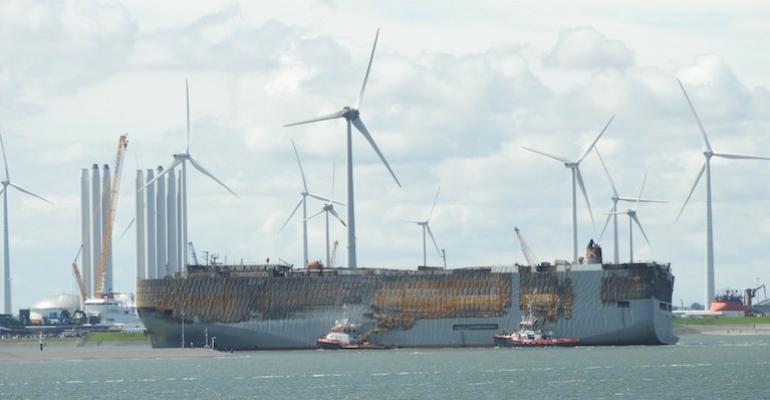The Japanese-owned Fremantle Highway was towed 64 km from a temporary anchorage to the Port of Eemshaven arriving at 3-30pm local time on Thursday afternoon, according to the Dutch Ministry of Infrastructure and Water Management
The Ministry said the towing operation was completed without any problems. The salvage of the vessel and its cargo of 3,000 vehicle will now continue in port. The Fremantle Highway is owned Shoei Kisen Kaisha and chartered by K-Line.
There had been fears that the vessel which caught fire later in the evening on 25 while transiting from Germany to Singapore might sink. During in firefighting operations too much water entering the vessel could have caused it to destabilise and sink.
There were 23 people on board the vessel, comprising 21 crew, a pilot, and a superintendent, when the fire broke out late evening on 25 July. One of the seafarers died in the incident, while several others were injured.
There have been an alarming number of fires involving car carriers and ro-ros and electric vehicles and their batteries are increasingly in the spotlight both as a cause of fire and being extremely difficult to extinguish. Nearly 500 EVs were reported to be onboard the Fremantle Highway when the fire broke out.
A report published in May 2022 by Allianz Global Corporate & Specialty (AGCS), a major property and casualty insurance carrier, said: “Fires have also become a major loss driver for car carriers. Among other causes, they can start in cargo holds, caused by malfunctions or electrical short circuits in vehicles, while the open decks can allow them to spread quickly. The growing numbers of electric vehicles (EVs) transported by sea brings further challenges, given existing counter-measure systems may not respond effectively in the event of an EV blaze. Losses can be expensive, given the value of the car cargo and the cost of wreck removal and pollution mitigation.”
One possibility could be dedicated vessels for carrying EVs. Captain Rahul Khanna, Global Head of Marine Risk Consulting at Allianz Commercial, commented: From an insurance perspective, this is something we would like to see – purpose-built vessels for transporting EVs, designed to substantially reduce the risk of fire. We have already seen shipping companies stop transporting EVs on their ships because of the potential fire risk.”
Copyright © 2024. All rights reserved. Seatrade, a trading name of Informa Markets (UK) Limited.
Add Seatrade Maritime News to your Google News feed.  |

